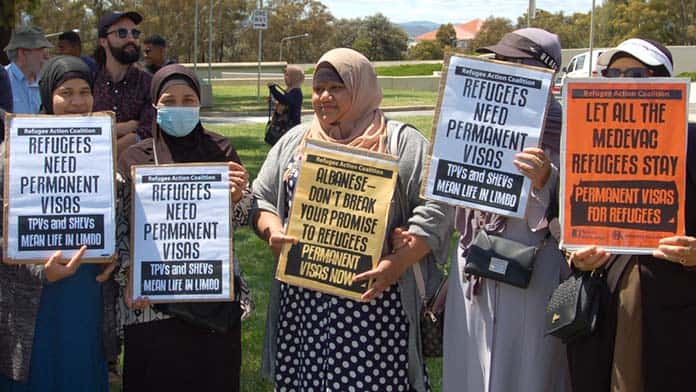On 29 November more than 1000 refugees rallied on the lawns of Canberra’s Parliament House to once again demand Labor make good on its pre-election promise to grant permanent visas to refugees on temporary visas.
Priya Nadesalingham from the Home to Bilo campaign joined the rally, calling on the government to grant permanent visas to all 31,000 refugees and asylum seekers on temporary refugee and bridging visas. Labor was willing to grant visas to the Nadesalingham family when they thought it would look good in the media.
Just two days later a jolly end-of-the-Parliamentary-year message from Home Affairs Minister Claire O’Neil proclaimed, “We have been working non-stop to create a better future for Australia.” O’Neil mentioned cost of living, wages, the anti-corruption commission, and aged care. She even said she is trying to fix the migration system. But asylum seekers and refugees didn’t get a mention.
In response to the growing anger, Labor has announced two concessions. People on temporary refugee visas are now allowed to travel, meaning they can arrange to visit their families after almost ten years of separation. And Direction 80 that denied family reunion to refugees with permanent visas, if they were boat arrivals, by placing them at the end of the processing queue has been lifted. But these are small steps when refugees have been discriminated against for ten years.
Ministers Giles and O’Neil keep repeating that they are committed to implementing the promise, but they haven’t even offered a timeline six months after the election. It is widely expected that when the announcement finally comes, Labor will also address the issue of the 10,000 claims that have been rejected under the fast track system of refugee assessments.
As yet, nothing has been said about Labor’s promise to scrap the fast track system, despite the constant revelations of corruption and Liberal party cronyism in the Administrative Appeals Tribunal that deals with appeals.
Unfinished business
Labor’s message to the Medevac refugees and others transferred from offshore detention is still that they will never call Australia home, even though some have already been here for nine years, and have Australian partners and children at school.
Zahra Hashemi, an Iranian refugee, held with her husband and children on Nauru before being transferred under the Medevac law in 2018, told the Canberra rally:
“The refugees sent to Nauru and Manus have been punished for a decade. Offshore refugees have been denied protection just because of the date we arrived. Some people who arrived after 19 July 2013 weren’t sent offshore and will soon get permanent visas. Labor’s policy towards ex-offshore refugees is like a cruel lottery.”
Although the first six refugees from Nauru to be settled in New Zealand flew in November, and another handful will leave for Canada and the US this month, there are still almost 200 held offshore in Nauru and PNG.
Labor’s delay over permanent visas and its attempt to ignore its responsibility for refugees from offshore are driven by two things. It is paralysed by its pitiful concern that any shift in policy will see asylum boats attempt to come from Indonesia.
And secondly, Labor remains completely committed to offshore processing. Just after the May election, Labor enforced its turnback policy just as ruthlessly as the Coalition, intercepting boats and returning asylum seekers to Sri Lanka. Labor’s Richard Marles said, “We will continue them [turnback operations] without hesitation.”
Labor is throwing around $1 million a day to the notorious US prison company MTC to keep Nauru open while it has turned a deaf ear to the sick refugees on the island and to those from Nauru and Manus Island who are in Australia.
Permanent visas for refugees in Australia is only one part of the unfinished business the refugee movement has with the Labor government.
The refugees and asylum seekers in Nauru and PNG still need to be brought to Australia, and the ban on UNHCR refugees in Indonesia will have to end. To completely dismantle the Fortress Australia policies, Nauru will have to be closed and we will have to open the borders to all asylum seekers, including those who arrive by boat.
By Ian Rintoul






